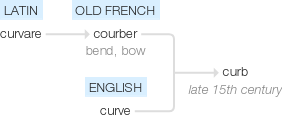Curb
late 15th century (denoting a strap fastened to the bit): from Old French courber ‘bend, bow’, from Latin curvare (see curve).
wiktionary
From Middle French courbe(“curve, curved object”), from Latin curvus(“bent, crooked, curved”). Doublet of curve.
etymonline
curb (n.)
late 15c., "strap passing under the jaw of a horse" (attached to the bit of the bridle and used to restrain the animal), from Old French courbe "curb on a horse" (12c.), from Latin curvus, from curvare "to bend," from PIE root *sker- (2) "to turn, bend." The same word was used late 14c. in the sense of "a hump," and in Anglo-Latin as "curved or arched piece of timber" (late 13c.).
Meaning "enclosed framework" is from 1510s, probably originally with a notion of "curved;" extended to margins of garden beds by 1731; to "margin of joined, upright stones between a sidewalk and road" by 1791 (sometimes in this sense spelled kerb). Figurative sense of "a check, a restraint, that which holds back" is from 1610s.
curb (v.)
1520s, of horses, "to lead to a curb," from curb (n.). Figurative sense of "bend to one's will, hold in check" is from 1580s. Related: Curbed; curbing.
